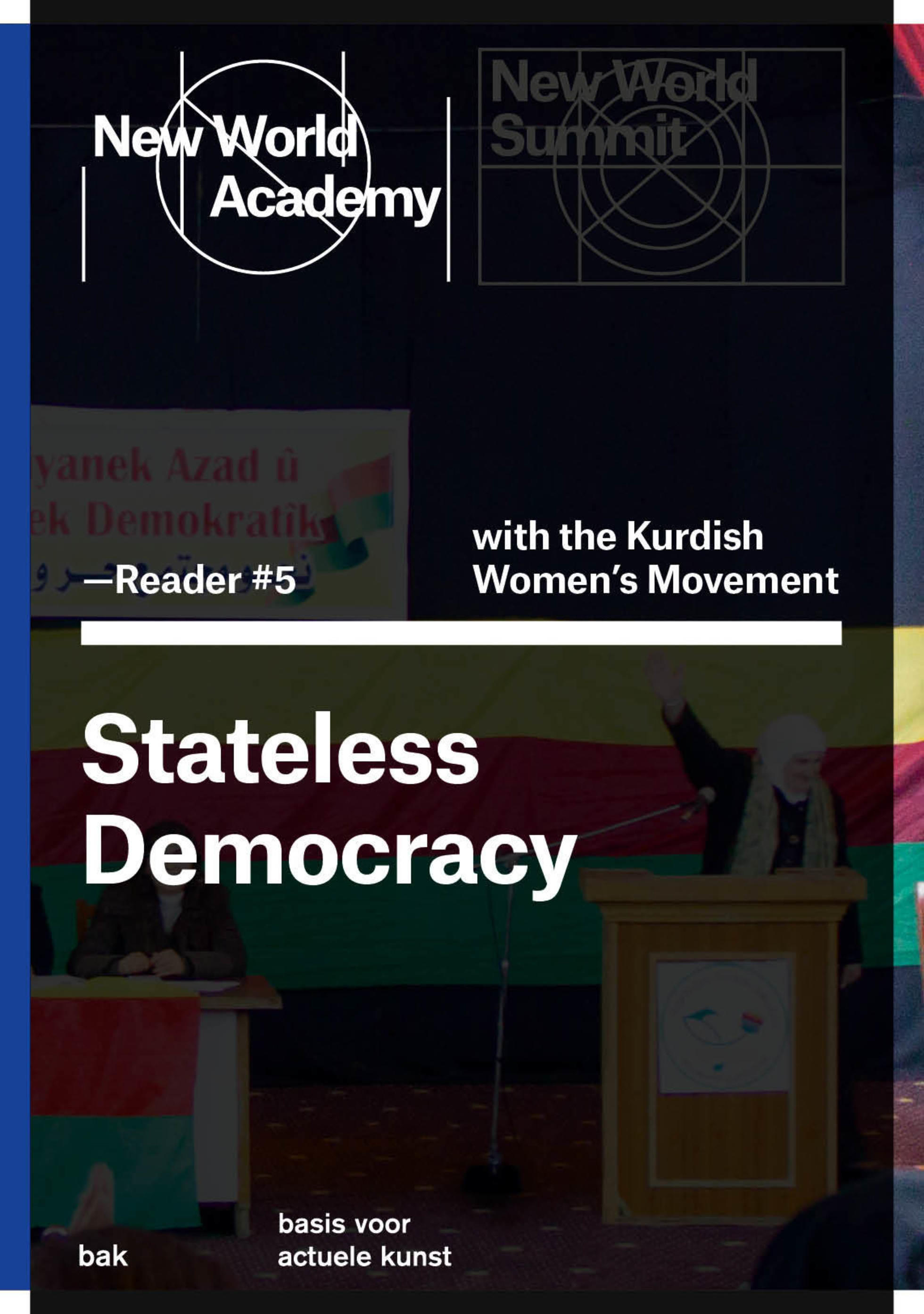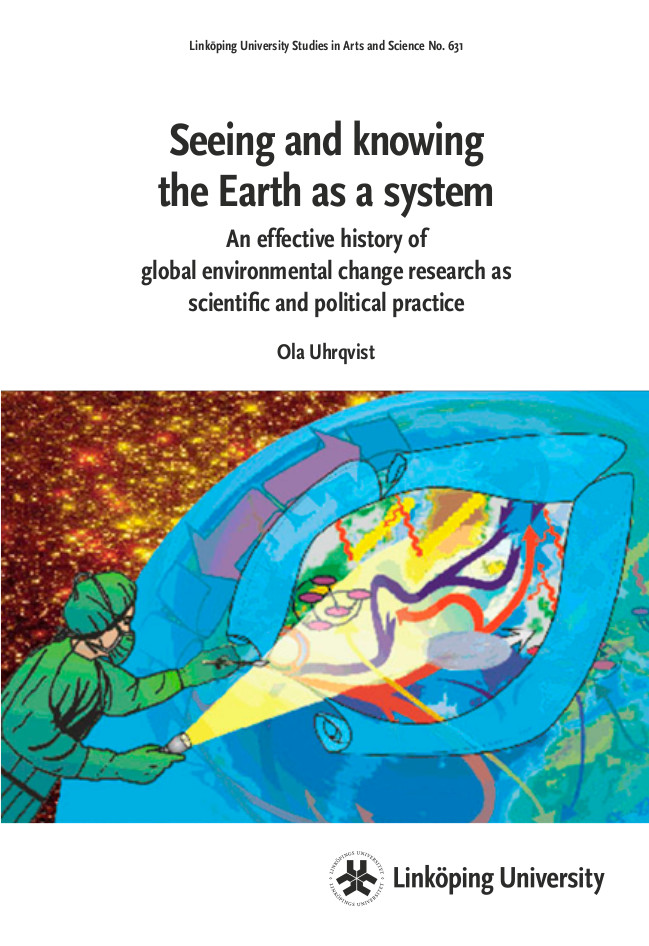New World Academy Reader, 5: Stateless Democracy (2015)
Filed under book | Tags: · democracy, gender, governance, jineology, kurdistan, politics, revolution, rojava, women

“New World Academy, an alternative learning platform for art and politics established by artist Jonas Staal and BAK has entered its fifth sequence. Developed together with the Kurdish Women’s Movement as a nomadic platform that unfolding throughout 2015, the fifth sequence of the New World Academy explores—from artistic, activist, and scholarly perspectives—the proposition of delinking democracy from the nation-state: the notion of “stateless democracy.” On this occasion, the fifth reader of the New World Academy, titled Stateless Democracy, has been published.
If initially the Kurdish struggle, led by the Kurdistan Workers’ Party (PKK), had aimed to establish an independent state, since the 1990s PKK leader Abdullah Öcalan, together with the Kurdish Women’s Movement, have turned to questioning the patriarchal and capitalist nature of the very concept of the nation-state itself. Within this process the Kurdish revolutionary movement developed an alternative model called “democratic confederalism” or “stateless democracy” that invoked a confederate composition in which gender-equality, self-governance, secularism, cultural diversity, communal economy, and social ecology form key pillars.
Since 2012 this proposition has been put fully into practice in Rojava, Western Kurdistan in Syria, in alliance with the peoples of the region. New World Academy Reader #5: Stateless Democracy provides key texts that offer an overview of both the political and cultural dimensions comprising what has now come to be known to history as the Rojava Revolution. The texts in the reader are as much an introduction to the model of stateless democracy practiced in Rojava, as a potential political paradigm through which to confront the many related crises in politics, economy, and ecology that we face across the world.”
With contributions by: Kajal Ahmed (poet and journalist), Ahmet Hamdi Akkaya (political and social scientist), Janet Biehl (writer, editor, and graphic artist), Murray Bookchin (libertarian socialist author), Dilar Dirik (researcher and representative of the Kurdish Women’s Movement), Zîlan Diyar (Kurdish guerrilla fighter), David Graeber (anthropologist), Havin Güneşer (journalist and spokesperson of “Freedom for Abdullah Öcalan – Peace in Kurdistan”),Joost Jongerden (sociologist and anthropologist), Gönül Kaya (journalist and representative of the Kurdish Women’s Movement), Abdullah Öcalan (founder and leader of the Kurdistan Workers’ Party (PKK)), Pinar Öğünç (journalist), Jonas Staal (artist and writer), and Hito Steyerl (artist, documentary filmmaker, and writer).
Edited by Renée In der Maur and Jonas Staal in dialogue with the Kurdish Women’s Movement (and in particular Dilar Dirik, Kurdish activist and a PhD student at the University of Cambridge, Cambridge)
Publisher BAK, basis voor actuele kunst, Utrecht, 2015
ISBN 9789077288221
256 pages
Out of print, now open access
Near Futures Online, 1: Europe at a Crossroads (2016)
Filed under journal | Tags: · democracy, economics, eu, europe, governance, greece, immigration, left, migration, neoliberalism, politics, refugees

“Europe at a Crossroads, the pilot issue of Near Futures Online, examines the recent history and potential fate of the two faces of “crisis” in today’s Europe, namely: the resistance and eventual surrender of the Greek government to the dictates of its creditors, and the growing tensions regarding the reception of asylum seekers and the place of immigrants in the EU.”
“Near Futures Online, the online companion of Zone Books’ Near Futures series, is a forum dedicated to the analysis of the challenges borne out of national governments’ and international institutions’ responses to some critical events – the financial crisis of 2008, the “Arab Springs” of 2011 – as well as ongoing developments such as climate change and soaring inequalities. Organized around a specific question, each issue of NFO brings together scholars, journalists, political activists, and artists, and includes contributions belonging to different genres and using a variety of media – essays and reportages, interviews and dialogues, photo essays and videos. Contributors are invited to address questions raised by NFO through an engagement with particular debates, histories, policies, and actors as well as to examine their possible trajectories in the near future.”
Edited by Michel Feher, William Callison, Milad Odabaei, and Aurélie Windels
Publisher Zone Books, Mar 2016
Open access
Ola Uhrqvist: Seeing and Knowing the Earth as a System: An Effective History of Global Environmental Change Research as Scientific and Political Practice (2014)
Filed under book, thesis | Tags: · anthropocene, climate crisis, earth, earth system, environment, governance, knowledge, knowledge production

“Previous research connecting scientific knowledge production with governing of the global environment usually start in international climate change negotiations and related assessments. From that vantage point Earth system science and models are studied as an expansion of Global Circulation Models. By tracing of the history of the present Earth system outlook this thesis offers a reflection about how scientific knowledge produce and connects problems with descriptions of desired order of things and strategies to get there. Knowledge becomes a productive power by shaping fields of possible action in relation to the global environment.
The interpreted empirical material consists of scientific discussions from the International global environmental change programmes and particularly the International Geosphere-Biosphere Programme (IGBP) and the International Human Dimensions Programme on global environmental change (IHDP). The studied period spans from the start of the planning of the IGBP in 1983 to the presentation of the new research programme Future Earth in 2013. The thesis is organised around the effects of the IGBP’s strategy to use predictive Earth system models as a tool to bring a broad range of scientific disciplines together.
The results demonstrate the historicity of the present Earth system outlook by showing how ecosystems and human dimensions were attributed new and more important roles as drivers of global change. The thesis also argue for the need to approach the ‘Earth system’ as a result of a productive tension between top-down perspectives found in global modelling and bottom-up empirical research engaging with process interactions down to local scales.”
Publisher Linköping University Electronic Press, Linköping, 2014
Open access
ISBN 9789175192369
91 pages
PDF, PDF (updated on 2018-6-11)
Comment (0)
